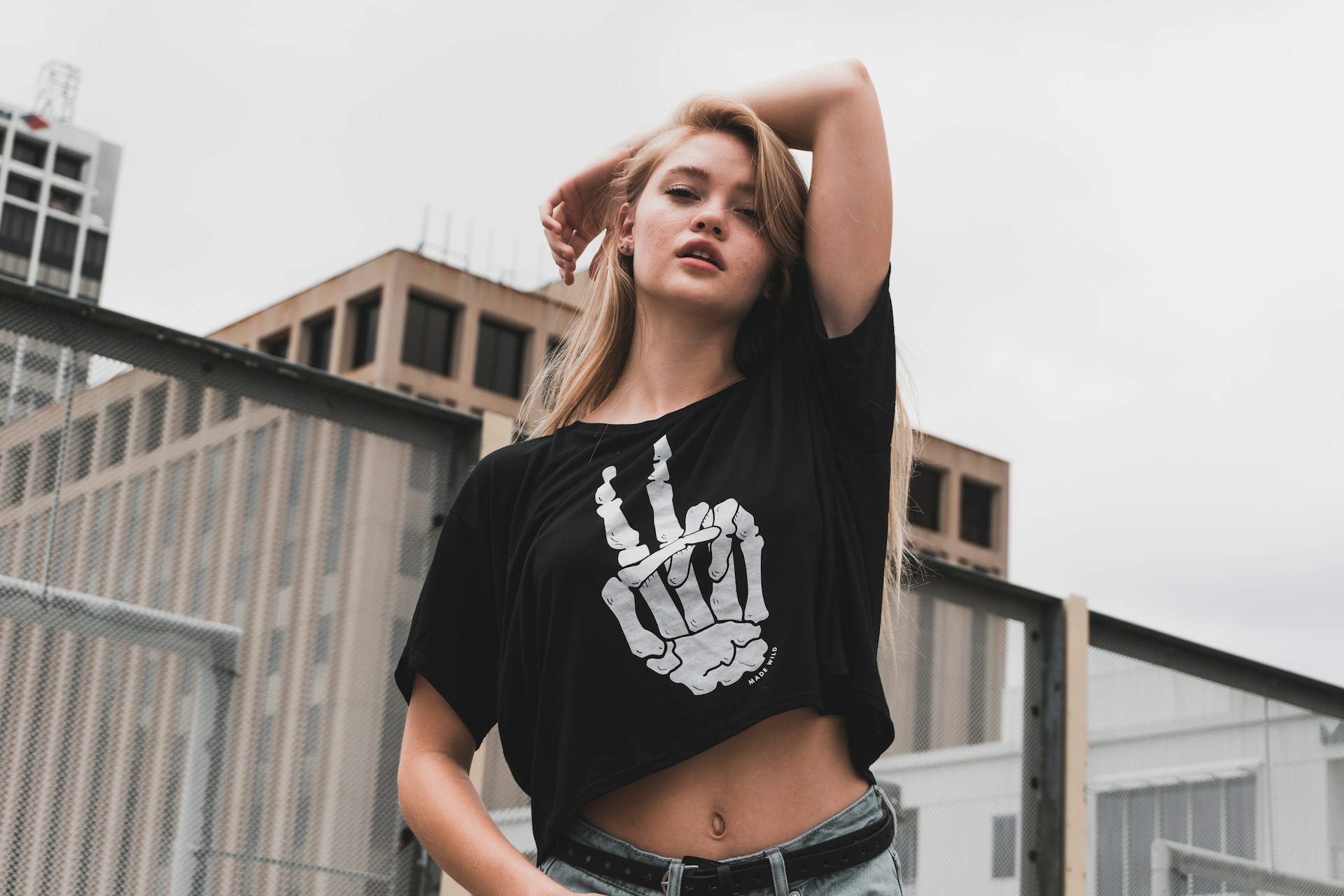What do James Dean, Princess Diana, and Billie Eilish have in common? At first glance, not much. But look closer, and you’ll see that each of these cultural icons has used a deceptively simple garment—the T-shirt—to craft an image, make a statement, or challenge societal norms. From humble undershirt to global fashion phenomenon, the T-shirt has become a canvas for expression, a medium for messaging, and a symbol of rebellion. And when celebrities get involved, its influence only grows.
The Iconic Beginnings: T-Shirts in Pop Culture
The T-shirt’s journey into the realm of celebrity culture started in the mid-20th century. James Dean, in the 1955 classic Rebel Without a Cause, transformed the plain white T-shirt from an undergarment into a symbol of youthful rebellion. Marlon Brando’s smoldering performance in A Streetcar Named Desire similarly elevated the T-shirt to icon status, solidifying its place as a wardrobe staple for the cool and confident.
These early depictions set the stage for decades of celebrity T-shirt moments, each redefining its cultural significance. Elvis Presley paired T-shirts with leather jackets, bridging the gap between rock and roll and everyday fashion. By the 1980s, Madonna’s customized T-shirts, emblazoned with provocative slogans, became synonymous with her boundary-pushing persona.
The Message on the Shirt
For many celebrities, the T-shirt is more than just a comfortable garment—it’s a message board. Slogans, logos, and graphics allow stars to express their political beliefs, endorse causes, or create viral moments.
Take Princess Diana, for instance. In the 1990s, she was frequently photographed wearing oversized, graphic T-shirts to the gym, juxtaposing her royal status with a relatable, casual aesthetic. Fast forward to today, and stars like Billie Eilish have adopted oversized, statement-making T-shirts as part of their brand, using the garment to challenge beauty norms and emphasize individuality.
Even more explicitly, celebrities have used T-shirts to advocate for social change. During the 2018 Golden Globes, actors wore black T-shirts under their suits as part of the “Time’s Up” movement, while others, like Natalie Portman, have worn shirts with feminist slogans to red-carpet events. Kanye West’s merchandise-style tees often carry cryptic messages, blending art, branding, and provocation.
Merch Madness: T-Shirts as a Celebrity Economy
T-shirts have also become a cornerstone of the celebrity merchandise empire. From concert tours to film promotions, a T-shirt is often the first piece of merch fans purchase to feel closer to their idols. Artists like Taylor Swift and BTS have perfected the art of limited-edition drops, creating a frenzy among fans eager to snag exclusive designs.

But it’s not just musicians who capitalize on T-shirt culture. Actors, athletes, and even influencers have entered the merch game. Consider Dwayne “The Rock” Johnson, whose Under Armour T-shirt line blends fitness and fandom. Or Kim Kardashian, who transformed her SKIMS loungewear into a billion-dollar brand, proving that the right celebrity endorsement can turn a simple T-shirt into a luxury item.
From Rebellion to Luxury
One of the most fascinating aspects of the T-shirt is its dual role as both a symbol of rebellion and an object of luxury. While a $5 white T-shirt can evoke the rugged individualism of Steve Jobs , high-fashion brands like Gucci and Balenciaga have elevated the T-shirt to a statement piece, often with price tags exceeding $500.
Celebrities, of course, are instrumental in this shift. Rihanna’s Fenty line features edgy, oversized tees that blend streetwear with high fashion. Kanye West’s Yeezy T-shirts redefine minimalism, stripping the garment to its essentials while commanding luxury-level prices.
Meanwhile, collaborations between celebrities and brands have created some of the most sought-after T-shirts in history. Virgil Abloh’s Off-White collaborations with figures like Serena Williams have produced limited-edition tees that sell out within minutes, becoming collectibles rather than clothing.

The Viral Power of a T-Shirt
In today’s social media-driven world, a single photo of a celebrity in a T-shirt can spark a global trend. When Meghan Markle wore a “The Future is Female” T-shirt during her time as a royal, the shirt sold out within hours, highlighting the immense marketing power of a celebrity endorsement. Similarly, Kendall Jenner’s band tee phase in the late 2010s revived interest in vintage T-shirts, creating a boom in the resale market.
Celebrities also use T-shirts to create viral moments that transcend fashion. Consider Shia LaBeouf’s infamous “I’m Not Famous Anymore” T-shirt, which he wore repeatedly during a period of personal controversy. The shirt became a meme, a performance art piece, and a critique of celebrity culture—all rolled into one.
Why the T-Shirt Endures
What makes the T-shirt such a powerful tool for celebrities? Its simplicity. Unlike haute couture gowns or bespoke suits, a T-shirt is inherently democratic. It’s accessible, relatable, and infinitely customizable. This universality allows celebrities to connect with their audience on a more personal level, whether they’re advocating for a cause, launching a brand, or simply stepping out for coffee.
In the hands of a celebrity, a T-shirt becomes more than just clothing—it’s a story, a statement, a spark. And while trends will come and go, the T-shirt’s ability to capture the zeitgeist ensures its place as a perennial staple of celebrity culture.
So next time you see your favorite star in a T-shirt, ask yourself: what are they really trying to say? Chances are, it’s more than meets the eye.




